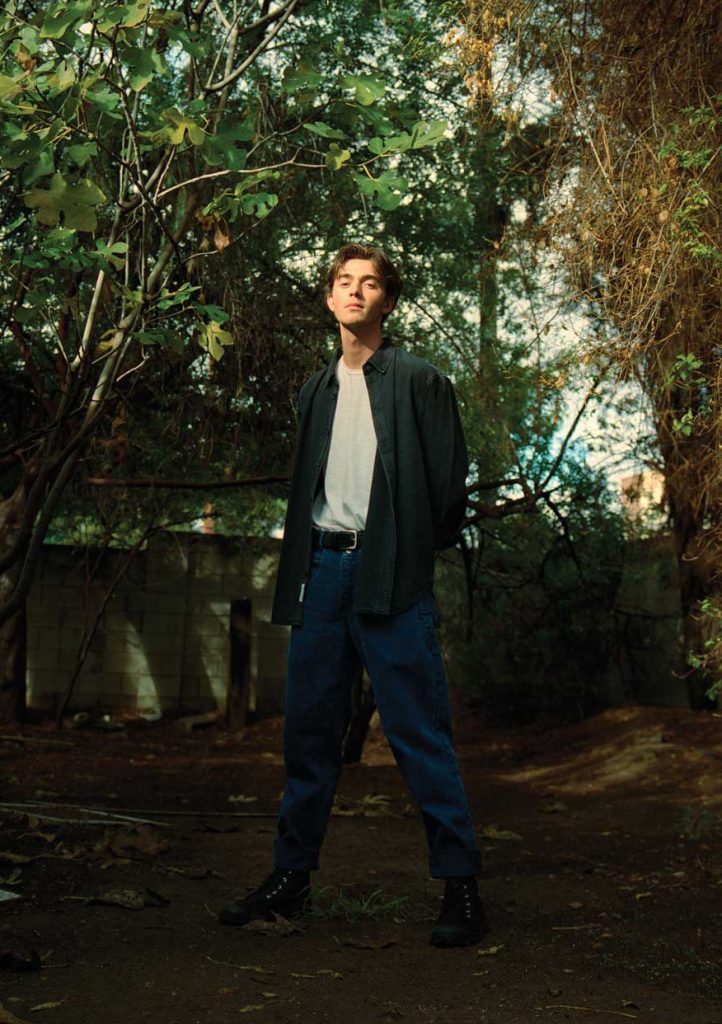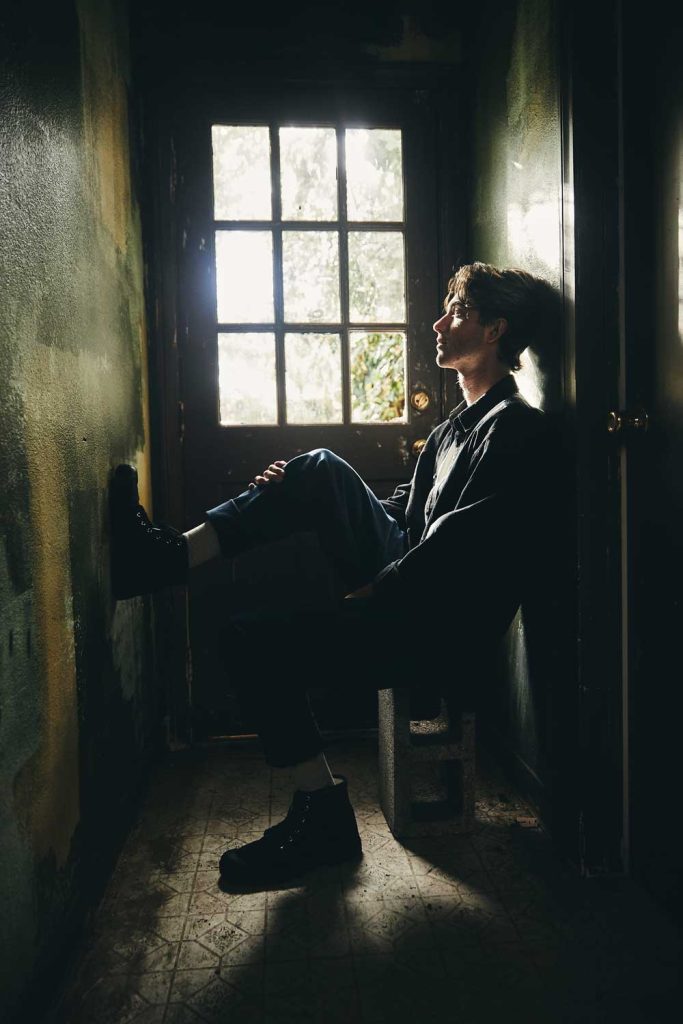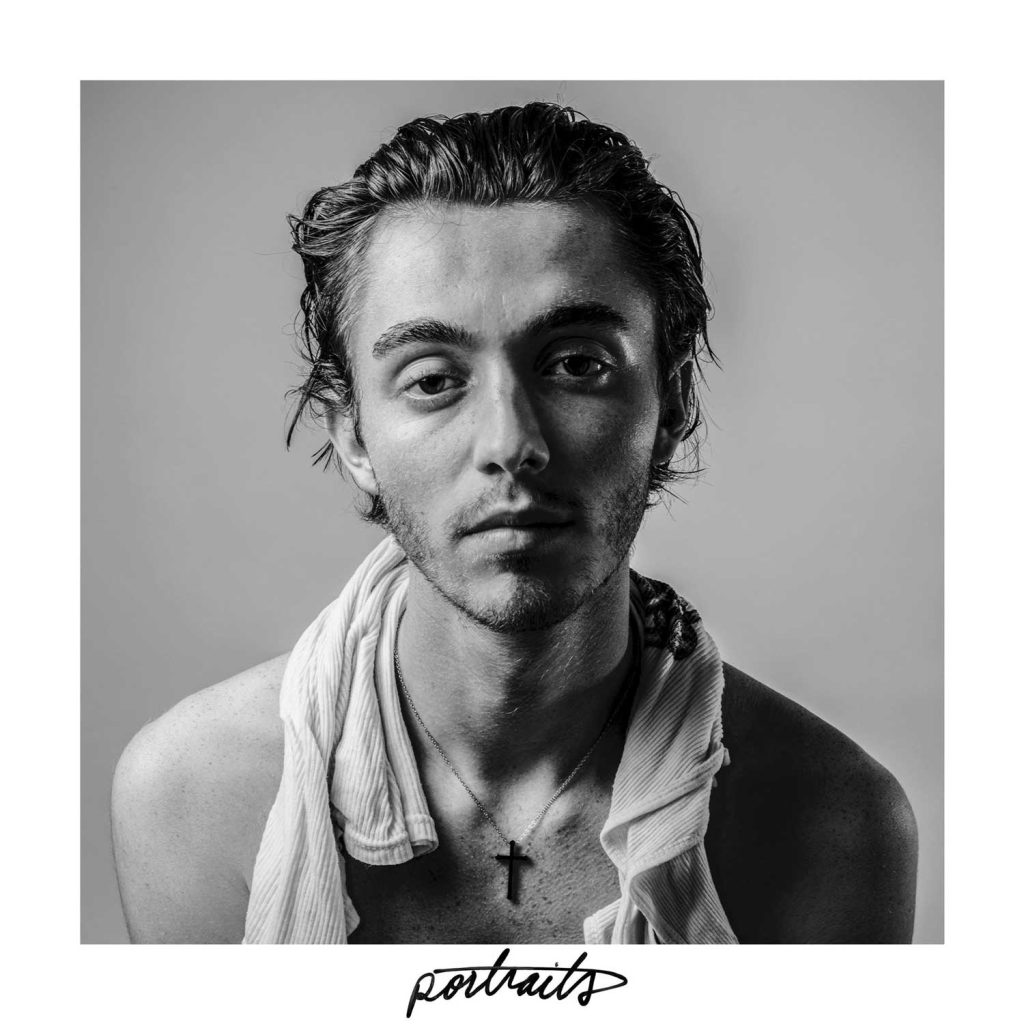PORTRAITS OF A YOUNG MAN
~ by joel martens ~

The world is as different as it can be, but when you get down to it, what makes us all human and connected, really has not. We are emotional beings who love, feel pain, have successes and suffer losses, eventualities that have forever driven writers and storytellers to create great literature, art and music.
Greyson Chance is one of those creatives. He came to the national spotlight in 2010, after his unforgettable performance of Lady Gaga’s “Paparazzi” was viewed by over 60 million people on YouTube. From there the ride has not stopped, with national television appearances, world tours and a debut album release Hold On ‘Til The Night in 2011, his EP Truth Be Told, Part 1 in 2012, including the single “Sunshine & City Lights,” followed by 2016’s EP release Somewhere Over My Head and the single “Back on the Wall.” All of which was done before he turned 19.
Early burnout was a factor for this very young man, but because of a supportive family and wisdom that belies his youth, he stepped away from the pressures of a career, breaking for a stint in college and doing what most young souls do when they attend… taking a moment to discover who they really are.
Chance is back now, with a renewed purpose and with a new album he is ready to share with us all. Portraits is a powerful catalogue of the time he was away, a potent collection of deeply personal and emotional music about love, loss, passion and growing into one’s self.
He’s performing at his first Pride celebration this June in L.A., then following it up with another in July during San Diego Pride, both as a newly out man, a process he also shared with the world via social media. The moment, like his new music, was and is poignant, touching and powerful… and he’s excited to share his new tunes with the world.
It’s been fascinating researching and learning about you. You’ve been a busy, busy guy and have been at this for so long already. What are the things that stand out for you around the early days of your career?
If I’m being completely honest, that part of my life feels like such a blur because it started almost ten years ago. The thing that sticks out to me the most now, is remembering the blessing of it all. Having an understanding of how amazing it was to do all these things and have all the opportunities I was having. Being fortunate enough to have my first Top 40 when I was 14, that was a really, really special moment. As a kid when you’re touring and doing that whole thing it can be quite overwhelming. But it taught me a lot and I’m very proud of who I am now because of it.
For such a young man you have such a maturity about you. To take a break when you did and give yourself a moment to figure out who you are without all the fame, was to me a really brave, smart thing. Was stepping away part of gaining a little perspective on who you are without music?
Yes. When I went to school, I had no intention of going back to music. I really felt done because I was so burned out creatively, there was no drive or passion anymore. Because of where my self-confidence was, and what I thought of myself as a musician at the time, I really thought, “It’s okay that this path might not be where you end up.”
It was important to try something else, and that’s what I discovered in college. I really found my purpose again, but it took time and me trying something new. To sit at a piano for the first time in nearly eight years without any pressure and being able to have a honest connection with it and my voice again. Having the conversation, “Okay, what do we want to say now?” Everyone goes to college to sort of find their purpose. I didn’t leave with a degree, but I left with a better understanding of where I needed to be. (Laughs)
I was just thinking about this a few days ago. I had just left university—it’s actually my one-year anniversary leaving coming up soon—which is pretty crazy. When I left, the goal I set out for myself for the year was that I wanted to make an album I wanted to tour with. I’ve managed to successfully do that, so it’s been sort of cool to see some goals accomplished.
The process is so changed for how a young artist finds his or her way in today’s world. Getting discovered online through your “Paparazzi” video, even the coming out process is different. Your statement online was so touching and powerful, and such a representation of how much LGBTQ acceptance has changed. I loved how you encouraged everyone to take the time they need to figure themselves out. Was there a specific reason you chose to include that piece?
Yes, and it’s sort of a long answer, so I’ll try to pair it down. I grew up in Oklahoma and I realized after spending a lot of time in L.A. and New York touring and working when I was younger, I would see this LGBTQ+ community that was so strong and powerful. Life is pretty breezy comparatively. Don’t get me wrong, there are still issues we need to work on, but it’s not the same as other more isolated places. What comes of a supportive world is this sort of expression or idea that you need to come out and be the proudest person in the world. You need to have your rainbow flag in the ground, step out on Sunset Boulevard and strut your stuff and be out in that way.
All I could think about was the kids in the Midwest and in different states or even some kids in L.A. and New York, who maybe are saying, “Well hey, I’m gay and I’m really proud of who I am, but maybe I want to adhere to the culture in a different way.” What I meant with that statement, was that you don’t have to love Drag Race or dress and wear your hair in a certain way to fit into the LGBTQ community. Your story is individualistic no matter who you are: You are a part of this bigger threadwork, you’re a bigger part of a larger quilt and connected to a larger community.

Where I’m from, safety is a huge thing as well. Our trans community in Oklahoma is very much at risk all of the time while I was still living in Tulsa. When your friends are thinking about coming out it’s important to support them, but also to make sure that they are safe when they do it. That their families are going to be okay when they do it, and they’ll be in a safe environment in school… all of those things are so important. Mainly what I wanted to say is that everyone is individualistic, and don’t think that you have to follow in someone else’s footsteps to be accepted. We will take you in no matter what.
Thank you for those wise words, they are so important. Would you do anything different around your coming out process?
I probably could have had a little more fun and a bunch more glitter around. (Laughs) I came out to my friends and family when I was 16, so it was years before I did it publicly. My parents and family were so accepting and anything that was problematic after the fact were just transitional things. Stuff like, “When G brings home a girl… Oh wait, no, we don’t want to do that anymore… Sorry.” (Laughs) It was stuff like that. I was so blessed that it was incredibly boring and incredibly great. I wouldn’t change a thing.
Now that you are out, do you at all feel pressure to be an activist? Or is it more just about who you are and how you live your life?
This is such a good question and it’s so relevant right now. I wouldn’t say I feel pressure, but I do feel an obligation to help for sure. For my case, I understand the platform I have, and I understand the way I can influence people. I do feel that it’s not necessarily fair to impose that same obligation on to every person who has Twitter followers or a platform, because they might not be comfortable with it. Me personally, as a proud-as-hell, Oklahoma, gay, liberal-ass Democrat, (laughs) I feel an obligation to help and to serve my community and my country to make it a better place.
You are going to make me cry. It’s really beautiful to see and hear your perspective, because it reflects how much the world has changed. Ideas and sensibilities which are mirrored in your album, it’s so deeply personal and vulnerable. Once you came out, did the process of songwriting change for you?
Oh man, thank you for that. To be honest with you, I don’t think the process really changed that much. I really owe that to the songwriting mentors I had early on in my career who guided me as I began writing. Their advice, not really even advice but more the rules of the studio were, “Be authentic always in your lyrics, story and everything.” So, I don’t think that when I started using him as a pronoun in the songs—which I guess was the most profound change—I was always talking about boys. So, for me it didn’t really change, because of the way I learned to write songs. You have to be authentic, or what’s the point?
You are definitely a songwriter and a lyricist; your words are lovely and powerful. I enjoyed the album title choice as well, instead of portrait, you added an “s” to implying multiple images and multiple stories. Was that a conscious choice?
Thank you for saying that and for noticing. The theme of the record was really inspired at first by photography. Which is to say that I have sort of a “House of Gaga” life, or a version of it in Oklahoma City. (Laughs) I have an amazing group of collaborators I work with and those creatives always have a camera on them. So, for the year when we were making the music, I was posing for a lot of my friends, which I enjoy doing. When we looked back at the photos, we noticed they were conveying emotions that reflected certain moments during the year. Times when I was going through a break up or thinking about this or that… you could see it in the photos. Once I realized that, I sort of slapped myself in the face and said, “This is what you’re doing with the music too!” The photographs express emotions and stories, so after it just seemed like a no-brainer to use it as an album title.
Tell me a little more about what some of the inspiration was for “Shut Up.” I really enjoyed the video by the way.
“Shut Up” is about a really common moment we all share in the beginning stages with someone, when you try to figure them out and are a bit infatuated. I wrote that about a romance I had abroad last summer with this guy I just met. I have a tendency to never be able to close my mouth, talking in circles, circles, circles. (Laughs) I was so madly obsessed and would talk about the most embarrassing things with him, to the point where it would just get ridiculous. The video has a bit more of a serious connotation to it though. I love dichotomy in art and contrasts, so that’s what we tried to do with it.
Let’s talk a little about “White Roses.” That song packs an emotional punch… Was it a breakup song?
Yeah, this is the one where I cry… That was sort of me finally shedding a lot of emotion about how I felt through my breakup last year. It was very difficult to write, but extremely necessary for me, because it healed me greatly. It’s sort of a tried and true breakup song and even now it’s difficult to talk about, so I’m going to leave it there.
Tell me a little about what it means to perform at L.A. Pride. Have you done a Pride festival before?
I’ve never played, I’ve only been a patron. (Laughs) I’m so excited and it’s something we’ve been talking about for a long time. To be embraced by L.A. and by the LGBTQ community in that way is super special. We’ve already started working on the show and how we’re going to make it a bit special from the last tour we just did. So, if anyone who saw the last show in L.A., they might see a few similarities, but for the most part it’s going to be different. I’m excited to go up there and perform and have a blast for the day!
For more information about Greyson’s performance and others at L.A. Pride, including Megan Trainor, Years & Years, Ashantie, Amara La Negra and MNEK to name a few, go to lapride.org/festival-2019.
Greyson Chance will also be performing at San Diego Pride on Saturday, July 13 for tickets to his performance and the many others performing there, or for more information go to sandiegopride.com.
For more information on Greyson Chance and his new album Portraits, go to greysonchancemusic.com.
